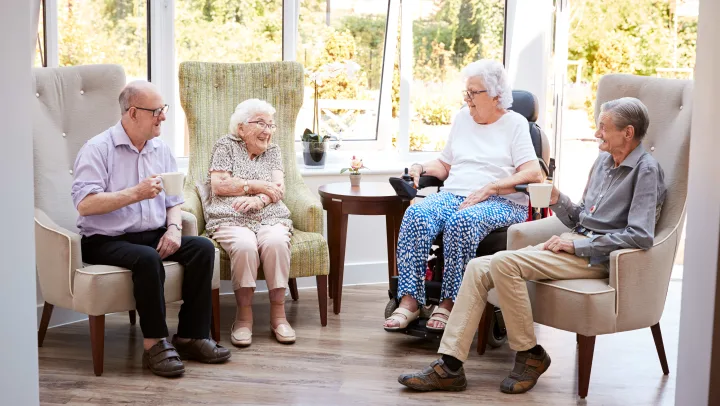The Function of Assisted Residing In Giving Specialized Care for Dementia Sufferers
The arrangement of specialized care for mental deterioration people within assisted living centers is progressively recognized as an essential element of effective mental deterioration monitoring. These atmospheres are designed to resolve the special cognitive and emotional obstacles dealt with by individuals with mental deterioration, using tailored assistance that promotes safety and security and wellness.
Understanding Mental Deterioration Care Requirements
Understanding the treatment needs of people with dementia is critical for supplying effective support and improving their lifestyle. Mental deterioration is a progressive neurological problem that affects cognitive functions such as memory, thinking, and communication. Individuals with mental deterioration often need aid with daily activities, individualized care plans, and psychological assistance.
Effective dementia care entails recognizing the special obstacles faced by each individual. This includes recognizing the phases of dementia, which can range from moderate cognitive problems to advanced stages needing detailed help. Care requires might incorporate assistance in taking care of daily routines, medication adherence, and preserving social communications to prevent isolation.
Furthermore, sensory stimulation and familiar atmospheres can dramatically boost the well-being of individuals with dementia. Caregivers must be trained to identify behavior changes and utilize techniques tailored to each person's preferences and past experiences. Techniques such as recognition therapy and memory can help communicate efficiently and foster a sense of safety.
Eventually, successfully dealing with the care demands of people with mental deterioration needs a caring strategy, ongoing training for caretakers, and a dedication to preserving dignity and respect throughout the caregiving procedure.
Advantages of Assisted Living

Assisted living promotes social interaction among locals, fostering a feeling of community and belonging. Involving with peers can alleviate feelings of seclusion, which are common in those living with dementia.
On top of that, many nursing home provide support with everyday activities, such as medication management, bathing, and dish prep work. This assistance enables citizens to preserve their self-reliance while ensuring their health and well-being are prioritized. Eventually, assisted living works as a useful resource, balancing care and freedom for people with dementia and their families.

Specialized Programs and Tasks
Furthermore, art and songs therapy play significant functions in fostering creative thinking and emotional expression (Memory Care). Engaging locals in painting, crafting, or songs sessions can provide healing benefits, assisting to reduce anxiety and enhance state of mind. Physical tasks, such as mild exercises and dancing sessions, are also critical, as they promote mobility and physical health while motivating social interaction among homeowners
Structured everyday regimens are typically developed to offer a feeling of stability and predictability for people with mental deterioration. These routines can include set up meal times, group tasks, and personalized treatment plans that satisfy specific interests and capabilities. By developing an enriching atmosphere full of customized tasks, aided living centers not just enhance the lifestyle for mental deterioration patients but likewise foster a feeling of area and belonging.
Educated Staff and Support
Furthermore, skilled team are equipped to carry out personalized care plans customized per resident's preferences and abilities. This customized strategy fosters a sense of autonomy and self-respect, permitting residents to participate in significant tasks that improve their top quality of life. The team additionally play a vital function in monitoring health and wellness, quickly identifying any modifications in condition that may require medical attention.
Along with direct care, trained staff provide psychological assistance to homeowners, aiding to alleviate feelings of confusion and anxiety that frequently accompany dementia. Their thoughtful strategy develops a caring atmosphere where locals really feel valued and understood - Memory Care. Eventually, the expertise and dedication of experienced team are crucial in delivering extensive care that fulfills the complicated needs of people coping with dementia in assisted living settings
Family Members Involvement and Resources
Family participation plays a considerable role in the treatment of individuals with mental deterioration in nursing home. Engaging relative in the treatment procedure not only boosts the emotional health of the citizen but additionally promotes a joint atmosphere where treatment plans can be tailored to specific requirements. Family members can offer valuable understandings into the preferences, history, and habits of their liked ones, which can inform caregivers and lead to more personalized care strategies.
Additionally, assisted living facilities usually offer resources for family members, such as support teams and educational workshops. These resources can aid families comprehend mental deterioration, improve interaction techniques, and create coping mechanisms. Involvement in these programs can equip member of the family, furnishing them with the devices essential to support their liked ones successfully.
In addition, regular communication in between family members and team is essential. This continuous discussion permits families to remain educated about their loved one's development and any type of adjustments in treatment strategies. More Bonuses Ultimately, a strong partnership between households and helped living centers cultivates a setting of trust fund and understanding, guaranteeing that individuals with dementia receive the specialized care they are worthy of while keeping their family connections.
Conclusion
In conclusion, helped living facilities play a vital function in attending to the distinct needs of mental deterioration clients via individualized care and assistance. Eventually, assisted living provides crucial sources that dramatically enhance the quality of life for those living with mental deterioration.
Comments on “Learn about tailored Assisted Living plans for elderly residents.”